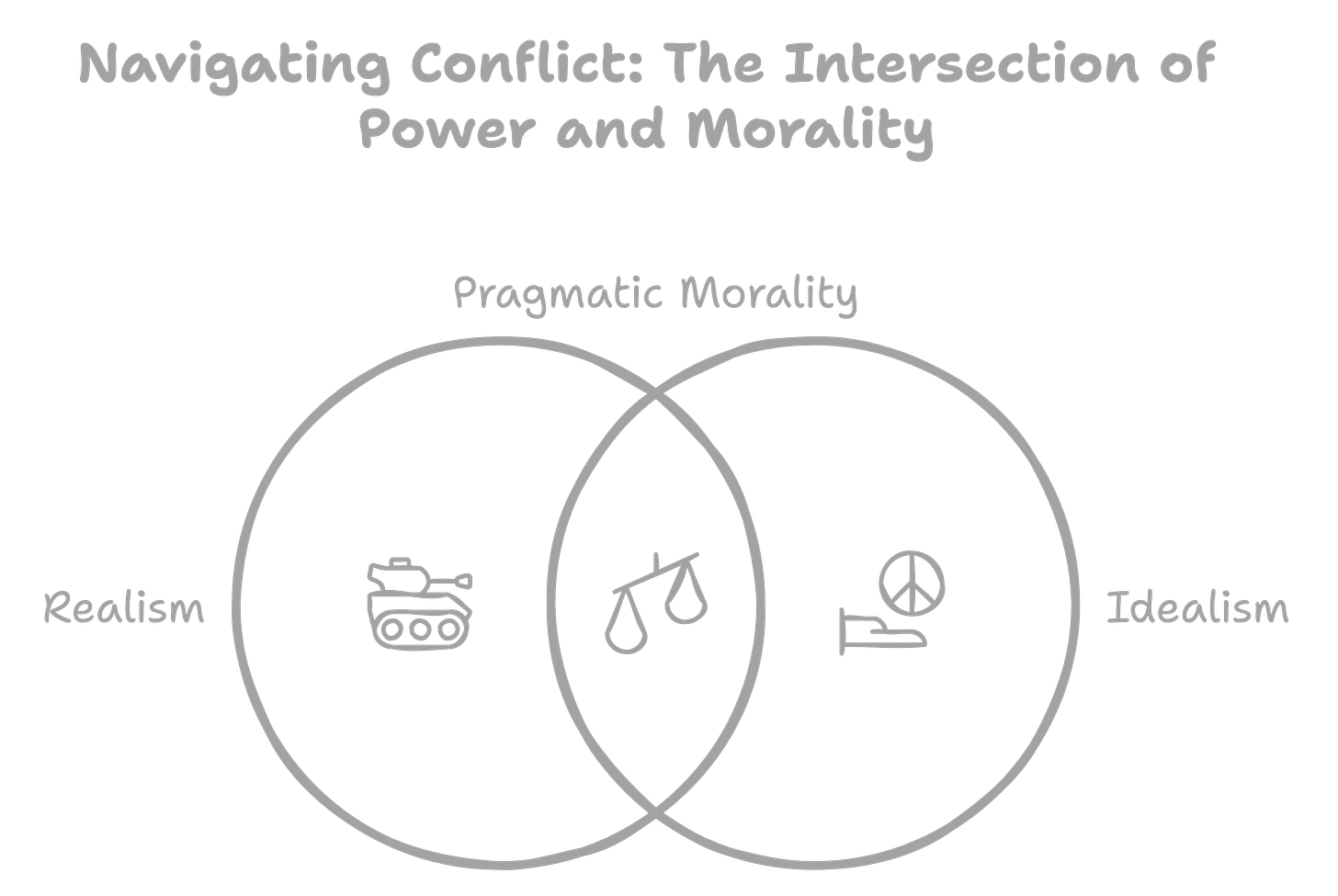"What If The War Ends Tomorrow?"
Realist or Idealist? Pacifist or Just War Theorist? Let’s Find Out Who We Are.
The ongoing war in Ukraine is a profoundly complex and tragic event, raising questions that touch on the deepest layers of moral, political, and philosophical reasoning. It compels us to wrestle with dilemmas with no easy answers, only trade-offs. As observers of this conflict, we are confronted with a question:
Should the war end now, even if that means negotiating peace from a position of compromise? Or does justice demand that Ukraine receive the support it needs to secure an upper hand before sitting at the negotiation table?
To better understand this dilemma, let’s think about the philosophical and ethical frameworks that inform these opposing perspectives. I am not writing this to take sides but to explore the underlying principles that shape each argument, inviting you to think about where you stand and why (at least in your mind).
The Dilemma: The Ethics of Escalation vs. Immediate Peace
At the heart of this debate lies a fundamental tension between two values: reducing immediate suffering and achieving justice that may require enduring further conflict. Both perspectives have merit, but they also carry significant risks.
Immediate Peace: Advocates for swift negotiations prioritize the cessation of violence to minimize human suffering. They argue that the lives lost every day are irreparable and that achieving peace—even a compromised one—should take precedence over territorial disputes.
Escalation Toward Victory: Supporters of escalation believe that enduring short-term sacrifices is necessary to achieve long-term justice. They argue that conceding to aggression sets a dangerous precedent, undermining international law and emboldening future acts of violence.
Realism vs. Idealism: A Political Lens
Political philosophy often contrasts realism with idealism to frame questions about power, morality, and conflict.
Realism: Realists view international relations through the lens of power dynamics, emphasizing survival and deterrence. From this perspective, escalation is a pragmatic necessity to preserve sovereignty, deter future aggression, and maintain the international rules-based order. A realist might argue that Ukraine’s resistance is not just about its own survival but about safeguarding principles that protect all nations from unchecked aggression.
Idealism: Idealists prioritize moral imperatives, such as peace, diplomacy, and human dignity. They argue that violence is a failure of humanity and that negotiation—even if imperfect—is a step toward restoring cooperation and reducing suffering. From an idealist perspective, the war’s human cost outweighs territorial or strategic concerns.
Which of these paradigms aligns more with your thinking? Can morality and pragmatism coexist in the face of war?
Pacifism vs. Just War Theory: An Ethical Framework
The ethics of war often revolve around two opposing traditions: pacifism and just war theory.
Pacifism: This perspective holds that war is inherently immoral. Pacifists argue for peace at all costs, believing that violence only perpetuates suffering and creates cycles of enmity. Figures like Tolstoy or Gandhi would contend that negotiated peace, even if it involves concessions, is morally superior to continued bloodshed.
Just War Theory: This tradition justifies war under strict conditions, such as self-defense or resisting aggression. Just war theory introduces three key principles:
Jus ad bellum (just cause): Ukraine has a legitimate right to defend itself against an invader.
Jus in bello (justice in war): Any escalation must minimize harm to civilians and avoid unnecessary suffering.
Jus post bellum (justice after war): The ultimate aim of the conflict must be a just and lasting peace.
Supporters of escalation might argue that Ukraine’s resistance meets these criteria, while critics might question whether the human costs of prolonged conflict are justified.
The Doctrine of Double Effect and Tragic Choices
War often involves actions that cause harm as a side effect of pursuing a greater good. The Doctrine of Double Effect suggests that such actions may be permissible if the harm is unintended and proportional to the benefits achieved. For instance, advocates of escalation might argue that civilian suffering, while tragic, is an unintended consequence of securing a just peace.
Yet even this framework acknowledges the tragic choices inherent in war: decisions between two evils. Should the immediate suffering caused by escalation take precedence over the injustice of territorial loss? Or is enduring short-term violence acceptable to prevent future wars?
Humanitarian Ethics: A Care-Centered Perspective
From a humanitarian standpoint, the focus shifts from abstract principles to the lived experiences of individuals. This lens asks us to consider the lives of those most affected by the war—civilians, families, and refugees—and prioritize their suffering above national or geopolitical concerns.
Proponents of immediate peace might argue that stopping the war as soon as possible is the most ethical choice because it prevents further loss of life.
Critics might counter that this perspective risks ignoring the broader implications of allowing aggression to go unpunished.
Is it possible to center human dignity while also considering the long-term consequences of decisions made during war?
The war in Ukraine forces us to grapple with profound moral questions that have no definitive answers:
Is it more ethical to seek immediate peace, even if it means compromising on justice and sovereignty?
Or should we prioritize justice and the long-term deterrence of aggression, even if that requires enduring more suffering in the short term?
These questions are not just about Ukraine; they speak to universal dilemmas about how we value human life, justice, and the principles that govern international relations.
Resisting oversimplified narratives is vital. War is a deeply human tragedy.
P.S.
I have experienced war, lost friends to it, and dealt with the aftermath of conflict. As a person from the Middle East, I have also faced neglect and been an internationally protected individual. Due to this complex background, I will set aside my thoughts and feelings about war, including the situations in Ukraine and Palestine, for another time.






